This website is protected by copyright, it's content in whole or in part may not be reproduced or used without the express written permission of
The Least of These ©2003 -
2018 Copyright -
The Least of These All Rights Reserved.
Fall 2010
God’s
favor
is
again
poured
out
on
the
team
as
it
ministered
in
Simferopol,
Belogorsk,
about
18
surrounding
villages
and
in
Kerch.
First
I
would
like
to
thank
each
one
of
you
who
faithfully
prayed
for
us.
It
is
impossible
to
express
how
much
we
appreciate
your
prayers.
The
trip
started
much
different
this
time.
Before
Sherrel
and
I
arrived
in
Ukraine,
Vitalik
received
a
phone
call
from
Missionary
Andrei
in
Simferopol
asking
please
come
early.
So
Vitalik
left
for
Simferopol
early.
The
ministry
in
Simferopol
is
a
partnership
with
a
local
Tatar
church
and
Andrei
and
Sveta,
missionaries
to
the
Tatar’s.
The
team
had
programs
in
what
we
would
call
courtyards
in
their apartment complexes. This was a time of sharing God’s word, songs, and fellowship.
Sherrel’s
and
my
train
arrived
in
Simferopol
about
1
p.m.
Saturday.
Pastor
Edik
from
Sevastopol
met
us
at
the
train
station
and
took
us
to
where
we
would
be
staying
that
night.
Sherrel
immediately
started
unpacking
our
suitcases
in
his
van
and
putting
close
to
200
lbs
of
supplies
in
bags
so
Edik
could
deliver
them
to
our
ministry
partners
in
Sevastopol.
What
a
blessing
Edik
is.
The
bags
contained
Shelter: Hats and scarves, craft materials, clothing.
Ditsky Dome II: Yarn, plastic canvas, other craft materials
Crisis Center for Women: Hospital gowns, baby blankets (crocheted by Savi)
Edik’s church: Clothing
That
evening
Vitalik
had
arranged
a
youth
service.
They
had
invited
youth
from
programs
earlier
that
week
and
from
the
local
church.
It
was
a
great
time
of
fellowship
sharing
songs
and
God’s
word.
There
were
about
30
youth
of
which
about
half
were
unsaved. We hope not for long!!
(For
those
of
you
who
do
not
know
the
Tatar’s
are
a
Muslim
people
group.**
Please
see
story
written
by
Surgun
below
“The
Crimean
Tatars’
Deportation and Exile.")
After
Sunday’s
program
we
headed
off
to
Belogorsk.
After
much
negotiations
(begging)
missionaries,
Andrei
and
Sveta,
parents
of
Anya
(13)
and
Lemon,
mother
of
Meryem
(14)
allowed
their
daughters
to
miss
a
week’s
school
and
be
team
members
with
us
in
Belogorsk.
AGAIN,
GOD’S
FAVOR
REIGNED.
We
were
blessed
to
also
have
two
Tatar
brothers
on
our
team
in
Belogorsk,
Ernest
and
Arthur.
Our
team
was
made
up
of
Vitalik,
Vitaly,
Pastor
Yuri,
Ernest,
Arthur,
Meryem,
Anya
and
Sergey.
We
were
able
to
have
20
programs
including
Belogorsk
Mental
Internot,
schools,
kindergartens
and
kid’s
club.
We
were
also
able
to
have
great
times
of
fellowship
and
prayer
with
missionaries,
church
workers
and
Tatar
families.
The
combination
of
God’s
favor,
his
living
word,
Ukrainians
and
Tatar’s
ministering
to
Ukrainians
and
Tatars,
was
incredibly
powerful.
Not
only
were
the
lives
of
children
and
youth
touched
but
also staff, teachers, directors, parents, grandparents and village leaders.
On Sunday we had a wonderful church service with Pastor Yuri and then off to Kerch.
KERCH.
In
Kerch
our
team
consisted
of
Vitalik,
Vitaly,
Lori,
Natasha
and
Kasusha.
Again
we
were
able
to
visit
the
children
at
the
TB
Sanatorium.
They
loved
the
program.
When
we
were
getting
ready
to
leave
the
director
came
to
Lori
and
asked
her
if
she
would
teach English a couple of days a week to the children of the staff at the Sanatorium. PTL!!
The
program
at
the
mental
internot
was
enjoyed
by
the
children
and
staff
alike.
We
had
meetings
with
the
new
director
at
the
Kerch
Internot.
Our
meeting
was
on
November
9th
and
she
had
only
been
the
director
since
the
1st
of
November.
She
seems
to
be
one
of
the
most
concerned
director’s
for
the
welfare
of
the
children
that
we
have
ever
met.
In
our
meeting
she
shared
with
us
that
the
medical
building
on
campus
had
no
hot
water.
The
next
day
The
Least
of
These
bought
a
new
hot
water
heater
and
delivered
it
to
the
Internot.
They
said
it
was
a
miracle
and
were
so
grateful.
We
had
incredibly
high
quality
time
of
fellowship
with
the
children
at
the
Internot. God truly blessed our time there.
Thank you again for all your prayers and support that make this ministry possible.
God bless,
Rich Richmond
The Least of These
914 SW Coast Hwy, STE 101
Newport, OR 97365
5
4
1
-
265-
5501
tlot@charter.net
http://www.theleastofthese.org
"Taste and see
that the Lord is good”
Psalm 34: 8


Simferopol Tatar Church






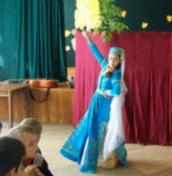
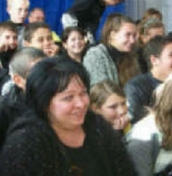

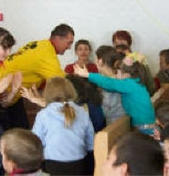




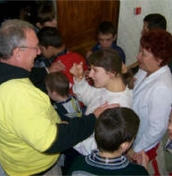


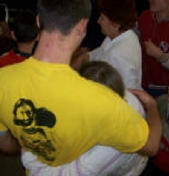



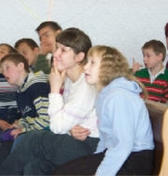










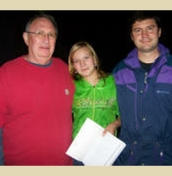









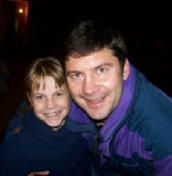

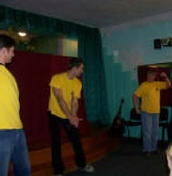



Sürgün: The Crimean Tatars’ deportation and exile.
Crimea
is
a
peninsula
located
on
the
Black
Sea
coast
in
the
south
of
today’s
Ukraine.
Part
of
the
peninsula’s
population
was
forced
into
exile
in
May
1944.
In
April
1944,
after
two
and
half
years
of
German
occupation,
the
Soviet
forces
regained
control
of
Crimea.
The
reconquest
was
hardly
completed
when
the
Crimean
Tatars
were
deported
en
masse
on
the
false
accusation
of
having
collectively
collaborated
with
the
Nazis.
This
Muslim
Turkic-speaking
minority
then
represented
19.4%
of
the
population
of
the
peninsula,
where
Russians represented over 50%.
On
May
18,
1944,
in
the
early
morning,
soldiers
of
the
People’s
Commissariat
of
Internal
Affairs
(NKVD,
the
former
KGB)
entered
Tatars’
houses
by
force
and
announced
to
their
astonished
and
incredulous
occupants
their
immediate
deportation
because
of
acts
of
“massive
collaboration”.
They
were
given
only
twenty
to
thirty
minutes
to
gather
some
personal
belongings.
Without
further
delay,
they
were
then
conveyed
to
several
stations,
where
they
were
loaded
into
cattle
trains.
In
the
matter
of
three
days,
nearly
180,014
Crimean
Tatars
were
deported
from
the
peninsula.
At
the
same
moment,
most
of
the
Crimean
Tatar
men
who
were
fighting
in
the
ranks
of
the
Red
Army
were
demobilized
and
sent
into
labor
camps
in
Siberia
and
in
the
Ural
mountain
region.
The
demobilized
soldiers
were
released
after Stalin’s death in 1953 and allowed to return to their families in their place of exile.
Over
151,000
Crimean
Tatar
deportees
were
sent
to
Uzbekistan;
the
rest
of
the
population
was
conveyed
to
regions
of
the
Union
of
Soviet
Socialist
Republics
(USSR),
mostly
in
Kazakhstan,
Tajikistan,
the
Ural
region,
the
Mari
Autonomous
Soviet
Socialist
Republic,
and
for
some,
to
the
region
of
Moscow
(Broŝevan
and
Tygliânc,
1994:
85).
The
conditions
of
the
transfer
by
train
were
particularly
difficult;
they
were
fatal
for
many
of
them,
especially
as
the
majority
of
the
deportees
were
women,
children
and
old
people.
The
weakest ones were carried off by malnutrition, thirst, cold, overcrowding and diseases that spread rapidly in packed train carriages.
The
conditions
in
the
places
of
exile
proved
to
be
just
as
tragic.
Even
if
their
arrival
was
planned,
the
deportees’
resettlement
had
been
prepared
poorly.
Local
authorities
were
informed
belatedly,
if
at
all.
In
a
context
marked
by
war
and
the
flood
of
deported
peoples
to
Central Asia, the local authorities did not have the necessary time and means to absorb physically and psychologically weakened people.
The
lack
of
accommodation
and
food,
the
failure
to
adapt
to
new
climatic
conditions
and
the
rapid
spread
of
diseases
had
a
heavy
demographical impact during the first years of exile.
The
Tatar
deportees,
from
now
on
considered
«
special
settlers
»,
were
placed
under
the
special
settlement
regime.
This
punitive
regime
had
deprived
them,
for
thirteen
years,
of
their
rights,
and
particularly
of
their
freedom
of
movement.
They
could
not
go
as
far
as
five
kilometers
away
from
their
imposed
place
of
residence,
and
once
or
twice
a
month
they
had
to
go
to
the
local
kommandatur
administered
by
the
NKVD
and
sign
an
attendance
register.
Finally,
they
were
forced
to
work
in
the
collective
State
farms
or
factories
and received meager wages.
Simultaneous
to
the
deportation
and
the
scattering
of
the
Crimean
Tatar
people,
the
central
authorities
launched
a
policy
of
«
detatarization
»
in
the
Crimean
peninsula:
the
main
monuments
and
places
which
recalled
the
Tatar
presence
were
destroyed;
books
about
Crimean
Tatars
or
written
by
Crimean
Tatar
authors
were
removed
from
the
library
shelves
and
some
were
burnt;
place
names
were
russianized.
The
status
of
the
peninsula
was
also
changed:
the
Autonomous
Soviet
Socialist
Republic
(ASSR),
which
was
established
in
1921
(in
which
Crimean
Tatars
enjoyed
a
positive
discrimination),
became
under
the
law
of
July
25,
1946
an
oblast
(an
administrative
term
which
means
region),
forming
part
of
the
Russian
Soviet
Federative
Socialist
Republic
(RSFSR).
The
passing
of
this
law
achieved
the
process
of
«
detatarization
»,
even
as
the
settlement
of
Russian-speaking
or
Ukrainian
settlers
into
the
houses
deserted
by
the
Tatars
was
carried
out.
In
1954,
the
Crimean
oblast
was
offered
to
Ukraine
to
mark
the
celebrations
of
the
300th
anniversary
of
the
union
between
Russia
and
Ukraine.
That
internal
decision,
which
did
not
have
an
immediate
effect,
proved
to
be
decisive
after
the
USSR disintegrated.
Stalin’s
death
in
1953
raised
hope
amongst
Crimean
Tatar
special
settlers.
However,
their
hope
was
quickly
dashed.
Indeed,
they
were
excluded
from
the
processes
of
rehabilitation
led
by
Nikita
Khrushchev
in
1956.
Thus,
whereas
most
of
the
punished
people
regained
their
political
rights
and
were
authorized
to
return
to
their
former
homelands,
Crimean
Tatars,
as
well
as
Volga
Germans
and
Turk-
Meskhetians,
were
sentenced
to
a
prolonged
exile.
If
from
this
year
on
they
regained
their
civic
rights
as
individuals,
going
back
to
Crimea remained forbidden. Moreover, this decision meant the negation of the collective existence of Crimean Tatars.



